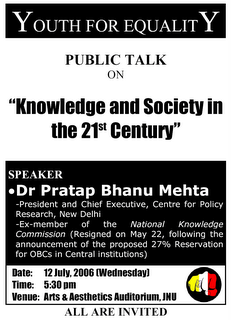Dr Pratap Bhanu Mehta speaks
 --------------------------------
--------------------------------
Below is the full text of the resignation letter Dr Pratap Bhanu Mehta sent to the Prime Minister on Monday, 22 May, 2006 (Source: The Indian Express, New Delhi, 23 May 2006)
--------------------------------
Dear Prime Minister,
I write to resign as Member-Convener of the National Knowledge Commission. I believe the Commission’s mandate is extremely important, and I am deeply grateful that you gave me the opportunity to serve on it. But many of the recent announcements made by your government with respect to higher education lead me to the conclusion that my continuation on the commission will serve no useful purpose.
The Knowledge Commission was given an ambitious mandate to strengthen India’s knowledge potential at all levels. We had agreed that if all sections of Indian society were to participate in and make use of the knowledge economy, we would need a radical paradigm shift in the way we thought of the production, dissemination and use of knowledge. In some ways this paradigm shift would have to be at least as radical as the economic reforms you helped usher in more than a decade ago. The sense of intellectual excitement that the commission generated stemmed from the fact that it represented an opportunity to think boldly, honestly and with an eye to posterity. But the government’s recent decision (announced by Honorable Minister of Human Resource Development on the floor of Parliament) to extend quotas for OBCs in central institutions, the palliative measures the government is contemplating to defuse the resulting agitation, and the process employed to arrive at these measures are steps in the wrong direction. They violate four cardinal principles that institutions in a knowledge based society will have to follow: they are not based on assessment of effectiveness, they are incompatible with the freedom and diversity of institutions, they more thoroughly politicise the education process, and they inject an insidious poison that will harm the nation’s long-term interest.
These measures will not achieve social justice. I am as committed as anyone to two propositions. Every student must be enabled to realise his/her full potential regardless of financial or social circumstances. Achieving this aim requires radical forms of affirmative action. But the numerically mandated quotas your government is proposing are deeply disappointing, for the following reasons. First, these measures foreclose any possibility of more intelligent targeting that any sensible programme should require. For one thing, the historical claims of the Scheduled Castes and Scheduled Tribes and the nature of the deprivations they face are qualitatively of a different order than those faced by Other Backward Castes, at least in North India. It is plainly disingenuous to lump them together in the same narrative of social injustice and assume that the same instruments should apply to both. It is for this reason that I advocated status quo for Scheduled Castes and Scheduled Tribes until such time as better and more effective measures can be found to achieve affirmative action for them.